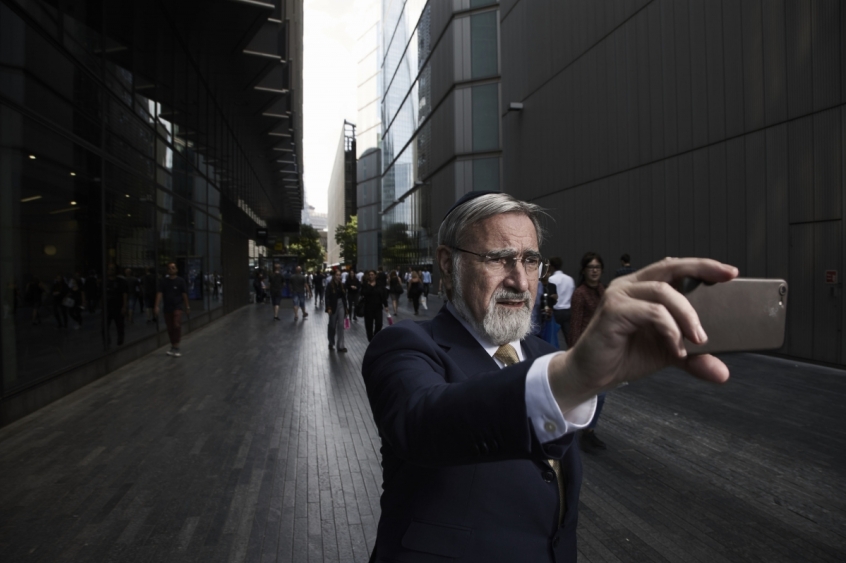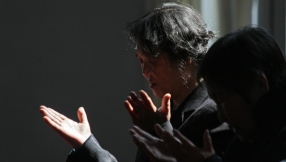Once in a while something happens that makes you sit up and take note.
This happened to me yesterday when I tuned into Radio 4's Morality in the 21<sup>st Century. This series lasts all week and features experts who talk to Jonathan Sacks about the trends of modern existence, and he in turn discusses their views with sixth-formers around the country.
The first programme in the series was about responsibility.

To help him discuss the issue of responsibility, he met the psychologist Jordan Peterson, the economist Noreena Hertz and the political philosopher Michael Sandel.
But for me the stars of the show were two sixth formers from local Manchester Grammar School, Adam and Tom, who put their own points of view on the benefits of the capitalist system firmly, politely and succinctly: leadership qualities in the making.
Jordan Peterson spoke about the twin dangers of totalitarianism and nihilism, and stressed one of his key rules: 'get rid of the people who are bad for you'. This includes family members if necessary.
Noreena Hertz had found that the generation born after 1995 (Generation K) did not trust institutions or corporations and only 10 per cent of them trusted governments. The credit crunch of 2008 had played a large part in this erosion of trust.
Michael Sandel stated that to leave personal morality outside the political debate in the public square would be an abnegation of personal responsibility. We cannot outsource moral judgments to the market, he said.
Peterson ended the programme by advising listeners to get their own houses in order before trying to save the world. He ended on a pessimistic but hopeful note: the world is far worse than we think it is. But we ourselves have far more potential than we think we have. The key is not to be 'happy' but to take on as much responsibility for ourselves and for the world we live in as we possibly can. Hope is there because, unlike optimism, hope involves our own contribution as humans. We are active players in our own destiny.
Today's progamme on the 'selfie' generation, featured Jean Twenge, a psychologist from San Diego State University and, like Hertz, an expert on Generation K, which she calls the 'I Generation'. Twenge has researched the pros and cons of smart phones and finds that this generation who are in love with their phones are less rebellious, more tolerant, less prepared for adult life and less happy than previous generations. It is a fact, confirmed by our own NHS research, that the K or I generation is more prone to mental illness than any other generation, and this is particularly true of girls.
One drawback of the social media phenomenon is the drop in face-to-face encounters and fear of the outdoors. Expression of emotions is regarded as a disease, as in the contemporary phrase on campus, 'catching feelings', as if it were the flu. The impression is gained of a physically cocooned, mentally and spiritually fragile generation, whose lack of encounter with physical harm is replaced by more and more attempts to self-harm, and even suicide. As for morality: anything goes as long as it doesn't harm anyone else.
Next, Sacks turned to the journalist and commentator, David Brooks, like Jordan Peterson from Canada, but now living in New York.
Brooks agreed with previous speakers that there is currently a huge surge in depressive illnesses and strongly recommends us to recognise the existence of the soul. There is something beyond our shape, size and colour which gives us the responsibility to yearn for righteousness. He calls this 'moral joy', the urge to lose ourselves in something outside of our selves.
He points to the inwards emphasis of much 'happiness' research, which does not qualify different types of 'happiness'. There is surely a difference between enjoying a pizza and the emotions experienced by 'rapturous love', for example. 'Giving back to the community' is another activity that features highly in his scheme. True happiness, he argues, comes when we are stressed and challenged, when we're pushed to be the most joyful – in the transcendence of self.
For this state to come about, relationships are paramount – the sacred bonds which move us from the I to the Thou. Brooks sees us as 'covenantal creatures'. And the four areas of such promise are family, vocation, philosophy of life and community.
The differentiation between mediaeval society and 'infinite freedom' is not correct. Heroes such as Lincoln and Churchill made promises. This is behaviour that we should emulate in our own ways.
Are young people commitment-averse, however? Do they think only of 'life in the now'? For Brooks, freedom includes, for example, the freedom to play the piano, which involves the commitment of practising every day. Our aim should be to 'fall in love' in such a way that we form a structure around this love that serves us well when things go catastrophically wrong and we still, he suggests, 'keep kosher'.
Brooks finished by positing the idea of the 'second mountain' in life which happens in our old age – 70 is the age he mentioned. In our twenties, we tend to wander around in the 'odyssey' of our lives, trying to find ourselves, build up a family and start a career. This first 'mountain' helps us to build up our ego. However, the second mountain is more important than the first. At this stage we 'pour back' into society, surrender ourselves to a worthwhile cause and can only do this after we have built up our egos when we were younger.
This series is truly inspiring: there is much agreement among the economists, psychologists, philosophers, religious thinkers and journalists on the need to support the youngest generation in their concern for justice and fairness and their need to use digital tools as an aid in this quest.
However, there is also agreement that debate is essential, morality should be key in all areas of life, and if I can put it in a religious way, learning to 'love your neighbour as yourself' is paramount. In order however to learn how to love our neighbour, the key is to first learn how to love ourselves, which is how it is stated in the Hebrew book of Leviticus. The 'kamocha' part doesn't just mean 'as yourself', but 'like you'. And this, it seems to me is the main lesson to be learned from the younger generation as depicted in this riveting series.
The series motto so far could be 'only when I learn how to properly love myself, will I be able to properly love you in a way from which society at large will benefit'. And for this, the Bible, it seems to me is still the key.
Dr Irene Lancaster is a Jewish academic, author and translator who has established university courses on Jewish history, Jewish studies and the Hebrew Bible.













